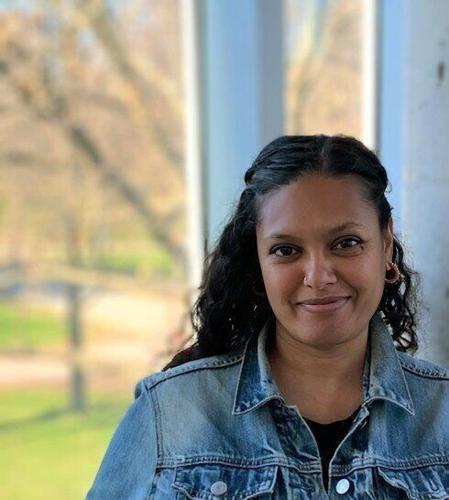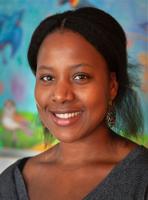The 2025 Invisible Publishing First Novel Prize was created in conjunction with York University to seek out bold manuscripts for publication.

“The Sailor and the Pugilist,” by Nadia Ragbar, Invisible Publishing,Ěý$24.95.
Its inaugural $3,000 prize went to ÎÚŃ»´«Ă˝’s Nadia Ragbar, author of the tragicomic “The Pugilist and the Sailor,” in which the relationship between conjoined twins Bruce and Dougie Reuben is tested by Bruce’s growing need to step out on his own. Smitten with his neighbour Priyanka, Bruce — a bookkeeper — can envision a new life for himself when his courteous epistolary advances are reciprocated.
“A letter introducing himself had been Bruce’s big move,” Ragbar writes. “He figured what he really wanted to write would almost guarantee his arrest. He wanted to tell her that there was a quality that he could vaguely recognize about her that was also the same about him, some sense of being on the outside of things.”
Dougie is an amateur boxer, whose career is jeopardized by sporadic blackouts that portend a deeper health issue.
Due to his blossoming relationship with Priyanka, and a doctor’s explanation that medical imaging is not possible while the brothers are conjoined, Bruce begins to realize that the only way to move forward is to entertain the unspeakable: a surgical separation.

Nadia Ragbar calls “A Mouth Full of Salt” gutting, hopeful and urgent.
What did you last read and what made you read it?
“A Mouth Full of Salt,” by Reem Gaafar. It opens in a Sudanese farming village in 1989 that has suffered a series of cataclysmic losses. A so-called witch living on the outskirts of town is blamed for cursing the villagers by merely casting her eyes on them.
The story hinges on the way that women are essentially sacrificed along the intersections of race and social standing. We see into the lives of three women, told against the larger socio-political backdrop of a coup, and further back to a Sudan on the verge of independence from Britain. It’s gutting, and it’s hopeful, and pressing in its urgency today.
What book would your readers be shocked to find in your collection?

Nadia Ragbar calls “All My Friends Are Superheroes” “a perfectly clever and sweet morsel of imagination and observation.”
“‘Fill ’er Up’: An Architectural History of America’s Gas Stations,” by Daniel I. Vieyra. I picked it up from a Little Free Library a few summers ago when my son was super into gas stations for about three weeks. We don’t own a car, and now he doesn’t even remember why he kept pointing out every gas station. It’s about 90 pages long, and so far I’ve only looked at the pictures.
When was the last time you devoured a book in one, or very few, sittings?
My favourite experience of this was reading the novella “All My Friends Are Superheroes,” by Andrew Kaufman. I read it on my shift as a receptionist at a gym, and as soon as I finished, I immediately went back to the beginning and reread it. It was such a perfectly clever and sweet morsel of imagination and observation while I had to wash and roll up towels, and sell people yearly memberships, and take inventory of protein bars and Gatorade.
Who’s the one author or what’s the one book you’ll never understand, despite the praise?
I will say that on two separate occasions I’ve started, and only gotten halfway through, “The Unbearable Lightness of Being,” by Milan Kundera. Both times I started off great, enjoying the prose, making notes in the margins, and then suddenly I can’t bear it. Both times I groaned and stopped at the same spot. I can’t remember what that scene was, but I do remember both times thinking: “Ugh. Men.” This is actually making me want to experiment with a third try and test if it’ll happen again!
What’s the one book that has not garnered the success that it deserves?
There is so much being published right now — tons of amazing writing happening locally, across Canada and in translation, and so much of it produced by small presses. Next on my to-read list is a chapbook called “Softness: A Meditation on Knitting,” by Jean Oberlander.
Though I haven’t read it yet, and can’t speak to its big picture success, it’s hand-sewn and contains illustrations, and that is enough for me. If success is attention, I’d like to put my attention on more tender, small things.
What book would you give anything to read again for the first time?
When I was 16 I read “The Favourite Game,” by Leonard Cohen, and it was the first capital-L literature book I read that was not homework. It felt so daring and stylish. That age is special because of the rush in discovering the things you resonate with. I’d give anything for that feeling of genuine surprise and instant recognition tied up together.
When you were 10 years old, what was your favourite book?
I was very into the “Anne of Green Gables” series, alongside the TV miniseries and sequel from the mid-1980s. I suppose it was my Harry Potter.
What fictional character would you like to be friends with?
In Anuja Varghese’s excellent short story “Remembrance,” from her collection “Chrysalis,” the narrator has a memory of an Indian woman coming into a small-town gas station to buy ice cream for her child while she goes to the motel across the street to kill her abusive husband. I imagine this woman to be a person who had been underestimated, forced to suppress a feral inner life. I love this story because it’s so cleverly not told from her perspective, forcing me (like everyone else in her life) to project all my stuff onto her. In this hypothetical, I think a friend like her might seriously inspire me to be less reserved, in general.
Do you have a comfort read that you revisit?
I use “The Essential Rumi” like an oracle. Whenever I am in that place of searching, I think of my issue, close my eyes, ask for help and flip to a random page. I always get a poem that speaks to my turmoil and brings immediate comfort. I just asked for a poem to help me with this questionnaire and I opened to the poem “Buoyancy.” (It’s a good one … spot on.)

Nadia Ragbar says she uses “The Essential Rumi” as “an oracle.” And when she finished reading “An Ocean of Minutes” on a bus, Ragbar found herself wiping away tears.Ěý
What was the last book that made you laugh or cry?
I finished “An Ocean of Minutes,” by Thea Lim, on the GO bus and I was wiping away tears. It’s a time travel novel set during a pandemic where a woman agrees to work for the company that sends people to the future so that her sick boyfriend could have present-day access to her health benefits and expensive medication. The couple agrees to reunite in the future, but snafus in time travel send her too far forward. She is driven to be reunited with her lover but the future sees her essentially stateless and working as an indentured labourer.
The morning after I finished reading, I saw a lady hugging her friend goodbye, and seeing that small, gentle act of parting made me tear up again in public. It’s beyond heartbreaking when our ability to express and receive love and touch and community and safety is rendered a luxury by a heartless system.

Nadia Ragbar says she wishes she could write like Sara Winman.Ěý
What is the one book you wish you had written?
Not that I would want to write this particular story, but when I read “Still Life,” by Sarah Winman, I wished that I could write just like her. The way that novel is written demonstrates such tenderness, dexterity, playfulness, clarity and gravitas. I could feel, radiating from the page, that Winman loved her characters deeply.
What three authors living or dead would you like to have a coffee with?
I have to start with patron saint Toni Morrison. David Sedaris, Patti Smith.
What does your definition of personal literary success look like?
It looks like having the curiosity, drive and means to keep writing and improving in my craft. If I can look back at the end of my life having written and published a few things, I will define that as personal literary success.






































To join the conversation set a first and last name in your user profile.
Sign in or register for free to join the Conversation